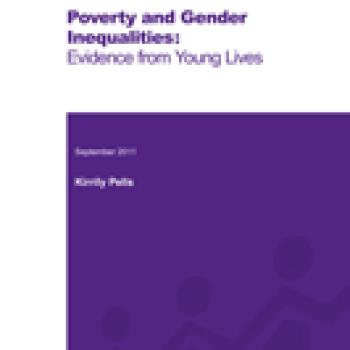
This paper brings together existing Young Lives research and policy analysis, alongside new findings, to argue that poverty and inequalities are at the heart of childhood risk, shaping which children are at risk, access to sources of protection, and children's life chances. Drawing on the rounds of survey and qualitative data collection conducted to date, it illustrates how risk is mediated through poverty and structural disadvantage, meaning that children from groups with low social status, from rural areas and the poorest households, have increased risk of having poorer outcomes in education, health and subjective well-being indicators. Policymakers concerned with reducing risk and improving protection should not focus on enabling individual children to "beat the odds" but instead on "changing the odds". This means targeting the root causes of children?s poor life chances, namely poverty and inequalities, rather than just the symptoms of risk.

This paper brings together existing Young Lives research and policy analysis, alongside new findings, to argue that poverty and inequalities are at the heart of childhood risk, shaping which children are at risk, access to sources of protection, and children's life chances. Drawing on the rounds of survey and qualitative data collection conducted to date, it illustrates how risk is mediated through poverty and structural disadvantage, meaning that children from groups with low social status, from rural areas and the poorest households, have increased risk of having poorer outcomes in education, health and subjective well-being indicators. Policymakers concerned with reducing risk and improving protection should not focus on enabling individual children to "beat the odds" but instead on "changing the odds". This means targeting the root causes of children?s poor life chances, namely poverty and inequalities, rather than just the symptoms of risk.

